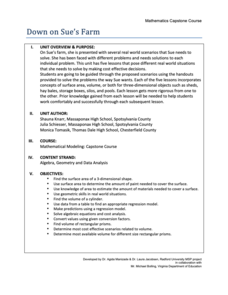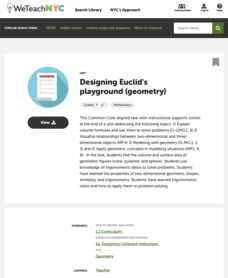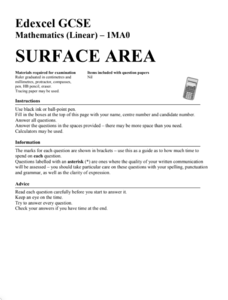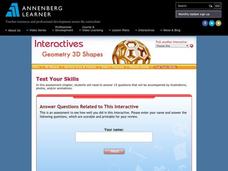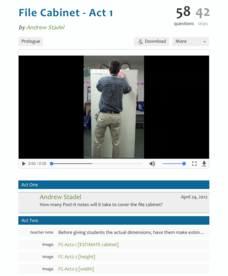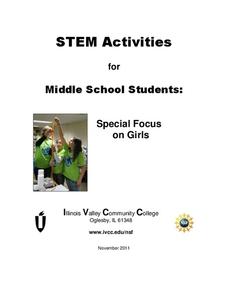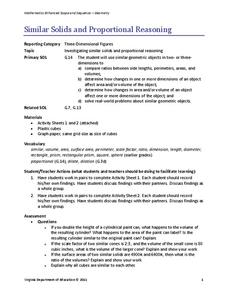Virginia Department of Education
Exploring 3-D Geometry
Take young mathematicians on an exploration of the world of 3-D geometry with this seven-lesson unit. After first defining the terms perimeter, area, and volume and how they apply to the real world, students continue on...
Radford University
Surface Area of Boxes
Explore surface area out of the box. Pairs investigate surface area by measuring two boxes and calculating the area of each side. Classmates trace one of the boxes onto butcher paper and create a net with the same area. Groups then...
Radford University
Building Sandcastles
Finalize the plans before playing in the sand. Learners design sandcastles using geometric and composite figures. They create blueprints, including the scale, and three-dimensional models of their castles. Finally, scholars calculate the...
Radford University
Down on Sue's Farm
When would a farmer use math? Class members work through five tasks on a farm that require knowledge of surface area, volume, and determining regression equations. The challenges range from figuring out the amount of paint to buy,...
New York City Department of Education
Designing Euclid’s Playground
Create a geometric playground. Pupils work through a performance task to demonstrate their ability to use geometric concepts to solve everyday problems. The accompanying engineering design lessons show teachers how the assessment works...
Mathed Up!
Surface Area
Surface area is the sum of the parts. Given the measurements of different prisms, pupils determine their surface areas. Individuals find the area of each surface and figure out the surface area by finding the sum. The video, part of a...
Concord Consortium
Swimming Pool II
Combine geometry and algebra concepts to solve a modeling problem. Young scholars consider the effect surface area has on volume. They write a cubic function to model the possible volume given a specific surface area and then...
Teach Engineering
Boxed In and Wrapped Up
If cubes have the smallest surface area, why aren't there more cube-shaped packages? Scholars take a box in the shape of a rectangular prism, cut it up, and make new boxes in the shape of cubes with the same volume. They then brainstorm...
101 Questions
Dandy Candies
Package design is an economic necessity. Young scholars assume the role in an interesting inquiry-based lesson. Given 24 cubic shaped candies to package, they must determine the arrangement that uses the least amount of cardboard to...
Annenberg Foundation
Geometry 3D Shapes: Test Your Skills
Time to find out what they've learned! The final lesson of a five-part series has learners complete a 39-question multiple choice review. They use what they've learned in the previous lessons to complete questions that include concepts...
Annenberg Foundation
Geometry 3D Shapes: Surface Area and Volume
Whether you wrap it or fill it, you're using geometric concepts. Classmates use an interactive approach to learn how to find volume and surface area of cylinders and prisms in the second lesson in a five-part series. The online lesson...
101 Questions
File Cabinet
Take the resource out of the file cabinet. Young mathematicians estimate the number of sticky notes it would take to cover the surface area of a file cabinet. They answer a set of questions on how the number of sticky notes would change...
Virginia Department of Education
Out of the Box
There's no need to think outside the box for this one! Scholars measure the length, width, and height of various boxes. Results help develop the formulas for the surface area and volume of rectangular prisms.
Virginia Department of Education
Attributes of a Rectangular Prism
A change is coming. Pupils use unit cubes to investigate how changes in the length, width, and/or height affects volume and surface area. They extend the results to write and test predictions on the effect of changing multiple sides on...
Virginia Department of Education
Surface Area of a Rectangular Prism
Wrap up a lesson on surface area with a resource that asks scholars to use the idea of wrapping paper to investigate surface area. They draw representations of rectangular prisms on graph paper to find the areas of the respective...
California Education Partners
Yum Yum Cereal
Design an efficient cereal box. Scholars use set volume criteria to design a cereal box by applying their knowledge of surface area to determine the cost to create the box. They then determine whether their designs will fit on...
EngageNY
End-of-Module Assessment Task: Grade 7 Mathematics Module 6
Determine the level of understanding within your classes using a summative assessment. As the final lesson in a 29-part module, the goal is to assess the topics addressed during the unit. Concepts range from linear angle relationships,...
Virginia Department of Education
Surface Area and Volume
Partners use materials to wrap three-dimensional objects to determine the formula for surface area. The groups use an orange to calculate the amount of peel it takes to completely cover the fruit. Using manipulatives, individuals then...
Illinois Valley Community College
STEM Activities for Middle School Students
Use STEM activities within the class to provide connections to concepts. The resource includes activities that range from working with buoyancy to building rockets and launching them. Other activities involve the engineering design...
Noyce Foundation
Building Blocks
Building blocks have more uses than simply entertaining children. Young mathematicians calculate the volume of a given cube, and then calculate the volume and surface area of a prism formed from multiple cubes.
Mathematics Assessment Project
Smoothie Box
Pupils demonstrate their understanding of nets by designing a net of a box that contains 12 bottles. Given the full size top and side views of the bottle, they determine the dimensions needed for the finished box. The directions do...
Willow Tree
Surface Area of Three-Dimensional Figures
Lateral area and surface area are simple concepts, but calculating them is not as easy! Using formulas, learners calculate lateral area and surface area for the same three-dimensional figures. The resource discusses the formula variables...
Math Drills
Volume and Surface Area of Rectangular Prisms
Your learners get solid practice calculating the surface area and volume of rectangular prisms with this learning exercise. There are ten versions of the activity for their enjoyment, and yours.
Virginia Department of Education
Similar Solids and Proportional Reasoning
Double the dimensions, quadruple the surface area. Pairs build similar prisms and compare the ratios of their surface areas and volumes to the ratio of the heights. Given two similar cones, partners determine the ratios of the lateral...





